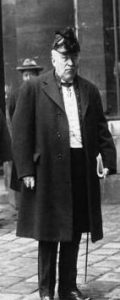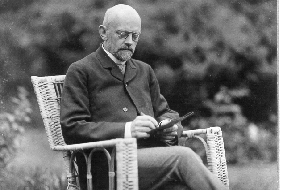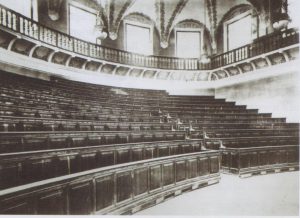
This year marks the hundredth anniversary of the end of the World War I, which wreaked quite a bit of havoc on European mathematics. This damage could be seen at the first two post-war International Congresses of Mathematicians, held in 1920 in Strasbourg and 1924 in Vancouver: the participation of the German mathematical community, the most important at the time, was banned, as was that of other nations that had lost the war (Austria, Hungary, Bulgaria).
One of the most combative mathematicians in favour of German exclusion was the Frenchman Émile Picard (1856-1941): “As for certain relations broken by the tragedy of recent years,” he said in 1920, “our successors will see whether a sufficiently long time and sincere repentance will one day make it possible to resume them, and whether those who have excluded themselves from it will be worthy of rejoining the concert of civilised nations. As for us, too close to the events, we still make our own the fine words uttered during the war by Cardinal Mercier, that to forgive certain crimes is to become an accomplice”. Of course, Picard had more than one personal reason to justify his anti-German stance. There were, in fact, four good reasons. The first was his father, killed during the siege of Paris in the Franco-Prussian War of 1870. The other three were his children: two sons and a daughter, all of whom died as a result of World War I.
In addition to these personal reasons, Picard may also have had professional motivations. It seems that the war decimated France of young mathematicians, and of young scientists in general; a disproportionately large number of them fell in the trenches: some speak of up to 40% of those enlisted. This loss of youth was felt in France’s mathematical power, which took a long time to reach its pre-war levels, and this was thanks to the push exerted by France’s enormous mathematical tradition and its political presence – it should not be forgotten that a mathematician, Paul Painlevé, was appointed Minister of War in March 1917, and was subsequently, from September to November of that year, Prime Minister of France.
The situation was perhaps not as dramatic in England, although many young scientists also lost their lives in the trenches, especially after the imposition of compulsory conscription in early 1916. The mathematical loss was, however, less severe in Germany, as young scientists were put to other uses in war than as cannon fodder in the trenches.
Exclusion was renewed in 1924. The International Congress was held that year in Vancouver but, in this case, the sense of mathematical community had begun to press, and there was an appeal from the American delegation, seconded by the Italian, Danish, Dutch, Swedish, Norwegian and British delegations, to remove the national exclusions imposed after the Great War. The initiative was successful, and in 1926 it was decided that those excluded could participate again in the next Congress, scheduled for 1928 in Bologna – the situation was similar in other sciences; for example, after the war, German physicists were not allowed to attend the Solvay Congresses until 1927.
There were, however, calls to boycott the Bologna Congress. Not only from Picard, who announced that he would not attend, but also from some German mathematicians; they complained, among other things, that one of the planned activities was a visit to a power plant located 200 kilometres north of Bologna, in a region that the Italians call Alto Adige and the Austrians call Tyrol, and which had passed from Austrian sovereignty to Italian rule after the First World War.

At the other end of the German scale was David Hilbert, head of the Institute of Mathematics at the University of Göttingen; at the time, Hilbert was by far the most prestigious mathematician, and Göttingen was one of, if not the most reputable mathematical centre in the world. Hilbert, one of the staunchest advocates of mathematical internationalism, had to work hard to defuse the German boycott of the Bologna Congress. Like Einstein, Hilbert had maintained a more pacifist and less nationalistic stance during the war. Both had refused to sign the 1914 declaration of 93 German intellectuals addressed “To the Civilised World” supporting the invasion of Belgium and the Kaiser’s bellicose attitude. Hilbert, moreover, had published an obituary of the mathematician Gaston Darboux in 1917; in the midst of the war this was quite a challenge because Darboux, besides being a great geometrician, was also French. Hilbert had to put up with a demonstration of university students outside his house demanding that the copies of the obituary dedicated to the “enemy mathematician” be destroyed; but Hilbert was not deterred, and demanded from the Rector a public apology from the University under threat of resigning his position there. The apology was immediately issued.
Finally Hilbert managed to ensure that the German mathematical community had a significant participation in the Bologna Congress: 76 participants; after Italy, Germany was the most represented nation. Of the other nations excluded at the 1920 and 1924 Congresses, 22 Hungarians, 9 Austrians and 5 Bulgarians participated in Bologna. Picard’s belligerent stance was not widely followed by the French, of whom there were 56 in Bologna.

The mathematicians successfully staged the reunification: “With much effort,” stated President Salvatore Pincherle at the opening ceremony, “the Organising Committee persevered to bring peace to the spirit of the people, reconciliation to the nations which the war pitted against each other, and to re-establish the collegial relations which have characterised mathematicians at the pre-war congresses”; and, almost as these words were spoken, the German, Austrian, Bulgarian and Hungarian delegations entered the congress venue. At the head of them all walked the now sixty-year-old David Hilbert. For a few minutes there was not a sound in the room,” wrote Constance Reid in her biography of Hilbert. Then, spontaneously, everyone in the room rose and applauded. Hilbert then took the floor and said:
Mathematics knows no race and knows no other homeland than the world of culture.
References
Guillermo Curbera, Mathematicians of the world, unite!, AK Peters, Wellesley, 2008.
Antonio J. Durán, Pasiones, piojos, dioses… y matemáticas, Destino, Barcelona, 2009.

Leave a Reply